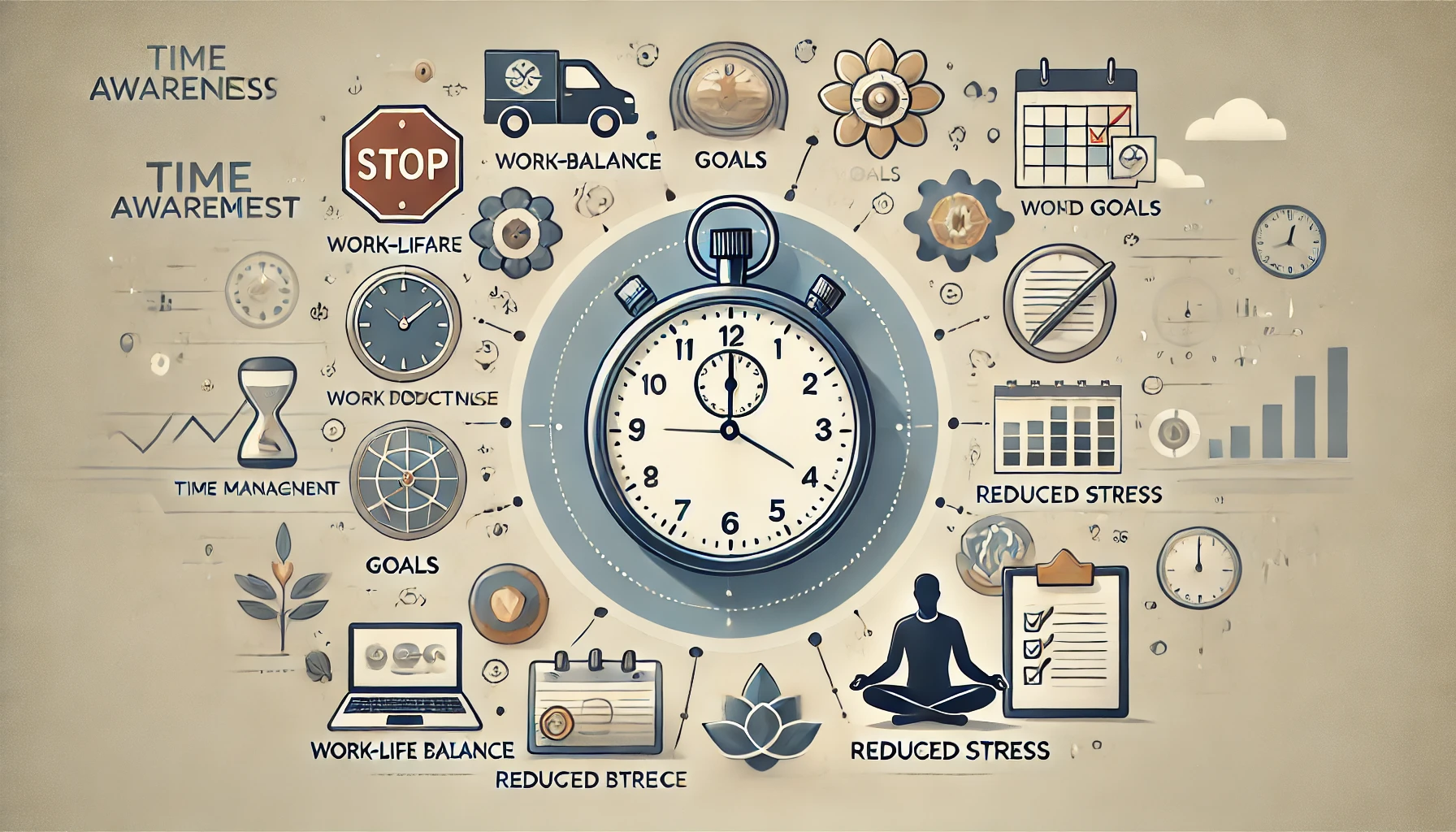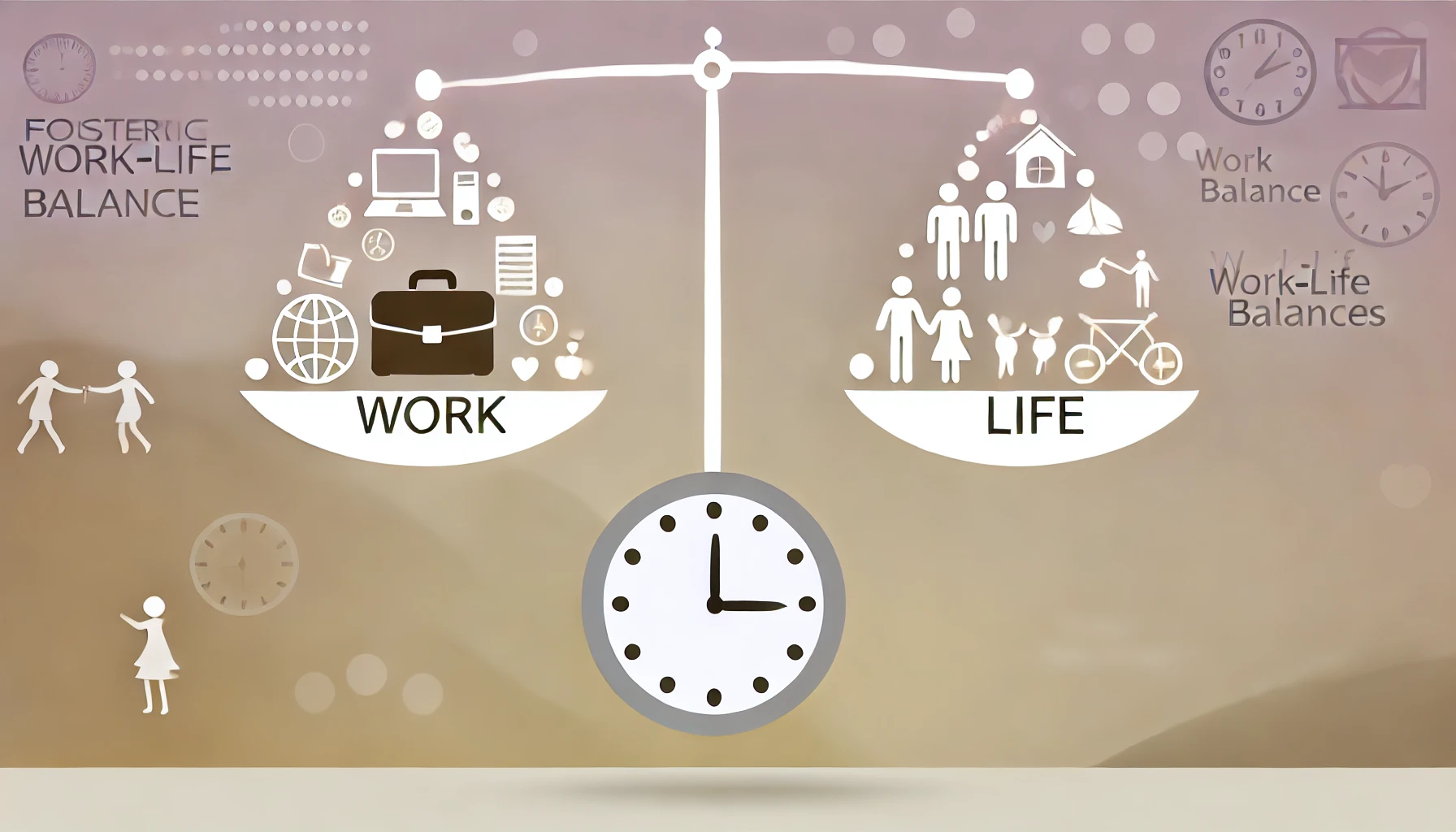Time awareness is crucial for managing time well. It helps boost productivity and is key in reaching goals. Being aware of time also aids in finding a balance between work and life and reduces stress. A UK study found people waste almost 2 hours daily, adding up to a month every year. This shows how important it is to get better at managing time. Wasting time not only reduces productivity but also increases stress and anxiety.

Bryan Clayton, founder of GreenPal, points out some big reasons we waste time. These include not knowing exactly what to do, lacking motivation, and struggling with self-discipline. But, learning to manage time wisely can help fix these problems. Time management can help by providing structure, setting priorities, and keeping us focused on what matters most. This allows us to enjoy time with our families, pursue hobbies, or travel without the stress of unfinished work.
Good time management matters a lot at work too. It can lead to better decisions, meeting deadlines, and improving our chances in our careers. As family law expert Laura Wasser notes, managing time well lets us deliver work that’s both high-quality and on time. This builds trust with clients, co-workers, and others. The importance of time management in professional settings cannot be overstated, as it directly impacts performance and career growth.
Focusing on good time management can also lower stress and keep us from feeling overwhelmed or too tired. By knowing when tasks are due and breaking them down into smaller steps, we feel more accomplished. This boosts our confidence too. Time management is important because it helps reduce stress and increases our sense of control and confidence. Effective time management also serves as a form of stress management, helping us handle pressure more effectively.
In the end, keeping track of time isn’t just about fitting more in our day. It’s about choosing smarter ways to work. This approach can make us more energized, productive, and successful in our important tasks. It helps lead a more fulfilling and balanced life. Proper time management ensures we make the most of our time, leading to greater satisfaction and well-being. Back to the top
Enhances Focus and Productivity
Time awareness helps people focus better and get more done. This not only helps with task completion but also boosts overall productivity by allowing individuals to manage their workload more efficiently.
It lets them prioritize tasks and choose what’s most important to do first. This leads to doing important things well and finishing tasks faster. As a result, increased productivity becomes achievable through effective time management.
Bryan Clayton talks about how using time wisely makes us better at focusing on what matters. Prioritizing tasks ensures that attention is given to high-impact activities, further enhancing efficiency.
This builds good work habits. Over time, these habits contribute to better productivity and reduced stress.
Focusing on productive work ensures that energy is directed toward meaningful outcomes. Time management is an important skill that benefits both personal and professional growth.

Improved Task Prioritization
Focusing on being aware of time helps us decide what to do first. Science shows we can really focus on only a few tasks at once. It’s important to identify and address urgent tasks first to ensure deadlines are met and productivity is maximized. This crushes the myth that multitasking works. So, we can avoid getting overwhelmed, focus better, and work more efficiently. Understanding which certain tasks require more attention helps us allocate our energy where it matters most.
Reduced Distractions
Organizing our time helps cut down on distractions. For example, we can limit times for checking emails. Using apps that block certain sites can also keep us focused. Eliminating distractions by using these tools is essential for maintaining concentration and working efficiently. Taking short breaks, like the Pomodoro Technique suggests, keeps our brains fresh and sharp. This helps us stay productive all day and avoid unnecessary distractions that can interrupt our workflow. Unnecessary distractions can significantly reduce our ability to focus and achieve our goals
Helps Achieve Goals Faster
Being aware of time helps you reach your goals faster. Making a to-do list and sticking to it is key. With this, you can move swiftly towards what you want to achieve. Completing tasks on time helps you meet deadlines and stay on track. IBM says knowing how to manage your time is a top skill for work today.
They recommend the Eisenhower Matrix to sort tasks. Effective time management also helps you avoid missed deadlines by keeping your priorities clear. The Pomodoro technique is also great. It suggests working in 25-minute chunks with short breaks. This boosts your focus. Breaking your work into manageable chunks and smaller tasks makes it less overwhelming and easier to complete.
The Forest app is another tool that helps. It rewards you with trees for focusing. Research shows multitasking is not effective for most people. So, focusing on one task at a time is better. For large tasks, breaking tasks into smaller parts helps you stay organized and make steady progress.
Waking up early and working mindfully helps big time. Setting time limits for your activities ensures you use your time efficiently and stay productive. It links your dreams to a set schedule. This shows how vital good time management is for achieving quickly and well.
Fosters Better Work-Life Balance
Being aware of time is crucial for balancing work and life well. Balancing your personal life with work is essential for maintaining happiness and reducing stress. The 2017 World Happiness Report says keeping this balance makes people happy. This happiness helps them stay longer at their jobs and work harder, according to CEB. Achieving this balance also supports well being and overall well being, making individuals more resilient and satisfied. Good time use also means better relationships and more fun activities. Managing time effectively allows people to nurture their personal lives, leading to stronger connections and support systems. Reducing stress through enjoyable activities also supports physical and mental wellbeing, as well as physical and mental health, which are vital for a balanced lifestyle. In modern day life, effective time management is more important than ever to handle the fast pace and complexity of daily demands.

Quality Time with Loved Ones
Giving time to family and friends helps make our relationships better. Many people (57%) feel the pandemic has hurt their work-life balance. They say they need to manage their time better. It’s key to set time aside for family and stick to it. Time off for vacations or family events keeps the balance and makes bonds stronger. Good time management also positively affects workplace relationships by improving trust and collaboration with coworkers and superiors.
Time for Personal Hobbies
Having a well-planned day also leaves time for hobbies. Nearly half of all workers feel too much stress, says Officevibe. By managing our time well, we can enjoy things we like and travel. Prioritizing mental wellbeing through self-care activities, such as engaging in hobbies and taking breaks, helps balance work and personal interests. Sometimes, work being more flexible helps with this. This balance means less stress, no burnout, and more happiness at work.
Reduces Stress Levels
Keeping track of time can really help lower stress. Effective time management can also help eliminate stress, leading to a healthier work-life balance. Long-term stress can cause big health problems like heart attacks. Stress can also negatively impact your productivity, relationships, and overall quality of life. Having a plan and sticking to it helps avoid the panic of last minute tasks.
It’s important to know what you’re good at and what you can improve on. Also, seeing how you’re different from others and changing how you act can make you better. This is part of being self-aware.
Another key part is emotional intelligence. It’s about learning to manage your feelings and also understand the feelings of others. By managing time well, people can feel more in control. Unmanaged stress can have a negative impact on both your personal and professional life. This helps reduce stress and makes mental health better.
Facilitates Smart Decision-Making
Being aware of time helps us make better decisions. It lets us think carefully about our choices. Effectively managing our time during decision-making ensures we stay focused and improve the quality of our choices. This is important to avoid making poor decisions, like those that led to war or ignored climate change.
Companies like Chevron and The Stanley Works show us how to make good decisions. They schedule special times for important decision meetings. Delegating tasks among team members during these meetings supports better decisions by distributing responsibilities and leveraging different perspectives. This reduces the chances of making a quick, bad choice.

Companies like Chevron and The Stanley Works show us how to make good decisions. They schedule special times for important decision meetings. This reduces the chances of making a quick, bad choice.
Informed Choices
Taking time to get and review the right info helps in making smart choices. Companies like Tenneco and General Motors show us what happens if we don’t do this. They suffered losses due to uninformed decisions.
Knowing the importance of time makes decision-making better. It connects the choices we make to our big goals.
Being able to make informed decisions is a crucial skill that leads to better outcomes and long-term success.
Reduced Procrastination
Procrastination is a big issue in decision-making. Setting clear time frames for tasks can help us be more decisive. This makes us act faster and more efficiently. Improved self discipline is another benefit, as sticking to schedules helps us stay organized and productive. According to Bryan Clayton, using time wisely also cuts down on waiting. It makes us more productive and our decisions better.
By being organized with our time, we can make smarter decisions. We also finish important tasks, meeting our goals both personally and at work.
Improves Professional Reputation
Being on time and managing your time well can really make people see you in a good light. It’s key for building trust with everyone you work with. When you master time management, you show your commitment to professionalism and reliability. This makes your work look better and yourself more professional.
Keep learning to better your job can bring new chances to work on exciting stuff. It shows others they can count on you. This is how you land big jobs and make more friends in your field.

Post smart stuff online often and join talks in your field to look good. Staying updated makes you a trusted advisor too. This is how you become a big name in what you do.
Having a great rep can lead to special things like more training and neat projects. A strong reputation is your key to new chances and getting ahead.
Always wanting things to be perfect might not be good for you, though. It can make some folks feel stressed and not good about themselves. Being great, but also knowing when you’ve done enough, is the real trick.
Using time well not just makes work better, but it makes you look good too. Practicing effective time management helps you deliver high-quality work consistently. This all adds up to a better job and feeling good about what you do. Developing effective time management skills is essential for building a strong professional reputation and advancing your career
Increases Free Time
Good time management gives people more time to do what they love. Creating a daily schedule helps ensure you plan ahead and make the most of your time. Creating a daily schedule helps ensure you plan ahead and make the most of your time. By planning out your day, you can find moments for relaxation or fun. At AMS, students have a long school day but some free periods. Building a daily routine helps them manage their time and stay organized. They use these times well for rest and other enjoyable things. Tracking work hours also helps balance productivity with downtime and improve their overall time management.
More Time for Rest
Having time scheduled for rest is very helpful. At AMS, there are several short times for a break during the day. This break in the day helps students feel better and do their schoolwork well.
Opportunity for Self-Improvement
More free time means more chances to grow and learn. At AMS, students use their extra time to put their lessons to use and build real skills. This makes learning more fun and productive.
Builds Positive Habits
Being aware of time helps us make good habits. It makes us follow a set routine, which is good for us. Tracking things like exercise, writing, and handling money helps. It lets us see what we do often and what helps us make better choices. Developing strong time management skills is essential for building and maintaining these positive habits.

For example, writing more on Mondays and Thursdays shows we can get better over time. Also, lifting weights three times a week has big effects on our bodies. This happened when someone kept training regularly for four months.
Being mindful and focusing on just one thing can make our routines even better. It lets us pay more attention to what we’re feeling or thinking. This not only makes us happier, it also cuts down on stress from doing too much at once. Doing things on a regular basis can actually change our brain, which is really cool.
In work, John Rockefeller showed how watching your money closely brings improvements. This is also true in our personal and work lives. Knowing what we’re doing can lead to positive changes.
Using apps to track habits can help us stick to good routines. It offers us information and helps us stay on track. With the right tools, we can improve our time management and overall health.
Allows Better Control Over Day-to-Day Activities
Control over daily tasks is key for success, personally and professionally. Breaking down large goals into smaller, manageable tasks makes it easier to stay organized and motivated. Being good at planning helps tasks flow smoothly. This means work is done well and is ready for surprises. Planning ahead also helps you manage your time effectively. Having this mix helps boost how we feel about life. Using time management strategies can further improve productivity, reduce stress, and help balance responsibilities.
Efficient Daily Planning
Good daily planning is at the heart of managing time well. It lets us choose what’s important, set real goals, and plan out every task’s time. Setting realistic deadlines for each task is essential, as it helps ensure goals are achievable and reduces unnecessary stress. Thus, we don’t waste time but do things that really matter. Using digital helpers like calendars and lists makes tracking our progress easy.
Enhanced Routine Management
Handling routines better is also very important. A set routine cuts down on chaos, keeps us on track, and lowers the chance of distractions. Giving tasks deadlines helps us keep moving and working well.
Knowing when we work best means we do important stuff at our peak times. This boosts our results and cuts stress.
Using these ways regularly means more chances for good things and less time wasted. This builds a life that’s disciplined and steady.
Fosters Time Awareness
Diving into time management helps people see how precious time is. We understand our time on earth is limited. So, we learn to use our time better. By becoming more aware of wasted time, we can focus on activities that truly add value and avoid inefficiencies. We start valuing our time and get better at choosing how to spend it. This way, we make smarter decisions about how to use our time.
Learning to manage time well helps us avoid common problems like putting things off or doing too much. We also see the need for rest and breaks to stay productive and well. This makes us better at doing things efficiently and makes life more enjoyable overall.
Conclusion
Time management is key to a productive life rich with balance. Everyone benefits from knowing how to use their time wisely. It helps with focus, makes us more efficient, and lowers stress. Not everyone sees time the same way. For example, Western cultures value tight schedules, while Eastern ones look at the flow of nature. Knowing these differences is important for working well with people from other countries. This helps reduce confusion and makes our professional image better.
Where we come from affects how we manage time too. Places like the USA, Germany, and Japan might work fast. On the other hand, the Middle East and Latin America often enjoy a more laid-back approach. People moving from one kind of place to another can find it hard. In fact, 20% might leave early due to these time differences. Knowing about these variances helps us make the best decisions. It also helps us reach our goals, manage work and life better, and form good habits.
Exploring how our brain and behavior deal with time sharpens our time management. This mix of insights shows the huge power of good time skills. Recognizing time management as an important aspect of self-discipline, prioritization, and work-life balance is essential for effective planning and overall well-being. It helps us live with more direction, meaning, and joy.
FAQ
Why is time awareness important for time management?
Time awareness is key for good time management. It helps people plan and focus on their tasks. Knowing time is limited, they can choose what’s most important. This boosts productivity, speeds up goal reaching, and improves work-life balance.
How does time awareness enhance focus and productivity?
Being aware of time lets people pick the most important tasks. This way, they can avoid distractions and stay focused. They stick to their plans and don’t wander off, becoming more productive.
Can time awareness help achieve goals faster?
Yes. It allows using time wisely, like following a to-do list. By doing this, people get closer to their goals faster. A structured approach makes achievements come quicker.
How does time awareness foster better work-life balance?
Good time management means more time for work and fun. This balance improves relationships and personal time. It makes life more harmonious and enjoyable.
How does time awareness reduce stress levels?
With a clear daily plan, there’s less stress about what to do next. Avoiding last-minute rushes and incomplete tasks helps. An organized day means a calmer mind.
How does time awareness facilitate smart decision-making?
Time awareness gives time to think and make smart choices. It cuts down on delaying by having set times for tasks. This makes deciding things quickly and wisely easier.
Can time awareness improve professional reputation?
Definitely. Timely and top-quality work makes a good impression. It wins over trust and respect from others. This boosts one’s image in the professional world.
How does time awareness increase free time?
By choosing and managing time well, free time grows. This extra time can be for rest, hobbies, or self-improvement. Making time for such things enriches life.
How does time awareness build positive habits?
Putting focus on what matters and handling duties well teaches valuable habits. These habits support a lifelong time and energy management practice. They lead to ongoing success and happiness.
How does time awareness allow better control over day-to-day activities?
Through smart planning and managing routines, day-to-day tasks become easier. This method ensures things get done smoothly but also allows for some flexibility. Thus, one gets a better grip on handling daily life.
What is the overall impact of fostering time awareness?
Learning to value time makes life more meaningful. It promotes purpose, satisfaction, and a balanced life. With a mindful approach, everyone can enjoy greater productivity and satisfaction

More Posts
11 Productivity and Time Management Tips for the Overwhelmed
The world is full of distractions. It can be hard to stay focused with social media and family needs all around us. But, we can get better at managing our time. By learning...
13 Ways Successful CEOs Manage Their Time
CEOs tackle big challenges that need great time skills to manage many roles. Studies by Harvard Business School experts like Michael E. Porter and Nitin Nohria show CEOs work around 62.5 hours every...
5 Task Execution Strategies to Avoid Procrastination
Procrastination is a big problem in work and life. Many people delay tasks, which hurts their productivity. In fact, only 26% of employees really know how their work helps the company. This leads to missed...
12 Best Monthly Reflection Questions to Ask Yourself
Since 2011, Eileen Chadnick has made it a tradition to offer thought-provoking reflection prompts for personal and professional growth. For 12 years, these questions have guided individuals in their self-improvement journeys, helping them...